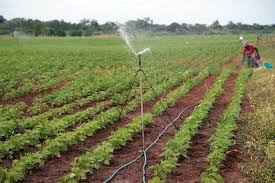
In the 21st century, digital transformation is no longer a luxury—it is a necessity, particularly in sectors like agriculture that are vital to both economic and food security.
Zimbabwe, a country where over 70% of the population depends on agriculture for survival, stands at the threshold of an agricultural revolution, one that can be powered by digital innovation.
Championing rural farmers through digital transformation is not only timely, but crucial to ensuring inclusive development, climate resilience, and long-term sustainability in the agri-food system.
A promising step in this direction is the “Fostering Digital Villages through Innovative Advisory and Profitable Market Services in Africa (FDiVi)” project.
Spearheaded by the Food and Agriculture Organisation (FAO) in partnership with Zimbabwe’s Ministry of Lands, Agriculture, Fisheries, Water and Rural Development, the initiative is targeting rural communities with the tools and knowledge they need to digitize their production and marketing systems.
In doing so, it is helping Zimbabwe take a confident step into the digital agriculture era.
Rural Zimbabwe faces a constellation of challenges—from erratic weather and soil degradation to limited access to markets, financial services, and reliable farming information.
These factors have historically hindered productivity, income, and the overall resilience of smallholder farmers.
- Opportunities abound in organic farming
- Ukraine war worsens Zim food insecurity: UN
- Feature: Greening the city gets community treatment in Zim
- Power, water shortages hit Chipinge chilli farmers
Keep Reading
While policy interventions and aid have helped in various ways, the missing piece has often been real-time, data-driven support. This is where digital tools can be game changers.
With mobile technology, artificial intelligence, and digital financial services, even the most remote farmers can now access weather forecasts, pest and disease alerts, mobile-based credit, and market prices—transforming guesswork into informed decision-making. In a country where 61.4% of the population lives in rural areas, the impact of such a transformation would be profound and far-reaching.
A standout feature of the FDiVi project is its grassroots approach: training farmers themselves to become digital champions.
In Mhondoro-Ngezi and Bikita, 30 lead farmers were recently trained in digital literacy, building on earlier efforts where 20 ward-based agricultural extension officers were similarly equipped.
In just 10 months, these officers have trained over 3,000 farmers—a clear demonstration of the power of community-driven capacity building.
This two-step, cascade training model is not only efficient, but it fosters local ownership and ensures that knowledge is rooted in the community.
As Dowsen Sango, FDiVi’s Zimbabwe project coordinator, pointed out, the five-day training focused on strengthening digital literacy among farmer organizations and building local capacity to support broader transformation.
Participants delved into a range of digital tools—from AI-enabled extension services to online marketing platforms—gaining both the skills and the confidence to lead change in their communities.
There are countless ways rural farmers can benefit from digital transformation.
Access to real-time agricultural advice: Farmers can use mobile apps and AI-powered platforms to receive instant guidance on planting, crop rotation, pest control, and soil management. This enables better crop yields and resource use
Improved market linkages: Through digital platforms, farmers can connect directly with buyers, cutting out exploitative middlemen and getting fairer prices for their produce. Online marketplaces also open access to regional and international buyers.
Weather forecasting and climate adaptation: Weather unpredictability has become a serious concern in Zimbabwe. Digital weather tools can help farmers make timely decisions, such as when to plant or harvest, and avoid climate-related losses.
Financial inclusion: Digital financial services, including mobile money and digital loans, help farmers save securely, access credit, and invest in inputs like fertilizers and improved seeds, boosting productivity.
Traceability and certification: For farmers aiming to enter formal or export markets, digital tools can help document practices, track harvests, and certify standards—key requirements for modern agribusiness.
The FDiVi initiative pays particular attention to women and youth, who are often the backbone of rural farming but remain digitally excluded. Prioritising them in digital literacy efforts ensures inclusivity and amplifies the social and economic ripple effects.
Women, for example, tend to reinvest their income into family health, education, and nutrition. Empowering them with digital tools could exponentially enhance community well-being. Similarly, involving youth infuses the sector with innovation, energy, and the tech-savvy mindset needed for sustainability.
Despite the potential, challenges remain. Limited network coverage, digital infrastructure, affordability of devices, and low baseline literacy can all inhibit widespread adoption. To overcome this, public-private partnerships must step in to expand rural connectivity, subsidise access to digital tools, and continue developing locally relevant apps and content in indigenous languages.
Moreover, digital transformation should not be viewed as a one-off project but as a long-term investment. National policies must embed digital agriculture into broader rural development strategies, ensuring sustained funding, monitoring, and evaluation.
Championing rural farmers through digital transformation is more than a technological upgrade—it is a moral, economic, and environmental imperative. With the right training, tools, and support, smallholder farmers can move from subsistence to sustainability, from vulnerability to resilience. Projects like FDiVi are setting the pace, but more must follow.
In a world increasingly shaped by data, connectivity, and artificial intelligence, it is time that rural Zimbabwe is not left behind. By building digital champions at the community level, Zimbabwe is not only planting the seeds of digital agriculture but also cultivating a new generation of empowered, informed, and resilient farmers. It’s a harvest the entire nation stands to reap.









